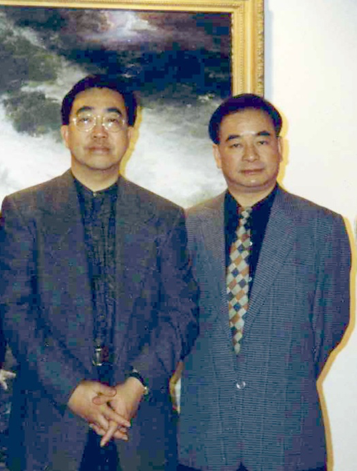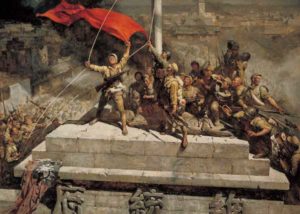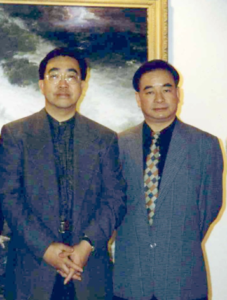好幾年前我就想寫一寫我與陳逸飛的一段交往,但遲遲未動筆,因為陳逸飛去世不久,不好讓人以為我有攀附之心,今天再來寫就可以輕鬆一點了。
Chen Yi-Fei was a household name towards the end of the Cultural Revolution. Red Flag, a Communist Party magazine published by the central government, took the unprecedented step of including his portrait in gouache of Jin Xunhuaas a full-color insert. The painting was an ode to the heroism of Jin Xunhua, an educated youth sent to the countryside. Jin had become a martyr saving timber at a forestry station during mountain floods. Later on, Chen worked with Wei Jinshan and others on a number of original large oil paintings such as Take the Presidential Palace. For a while, his fame surpassed that of the “Four Kings” in Guangdong Province.
陳逸飛在文革的晚期名聲如日中天,共產黨中央機關刊物《紅旗》雜誌以絕無僅有的高姿態插頁彩印他的一張人物水粉畫:《金訓華》,這是一幅歌頌下鄉知識青年金訓華在山洪暴發中奮不顧身地搶救林場木材而英勇犠牲的畫作。在那前後他與魏景山等人又創作多幅大型油畫如:《攻佔總統府》,他的名聲一時蓋過了廣東省的所謂「四大天王」(伍啟中,張紹誠,招熾挺,陳衍寧)。
In 1977, I went to Shanghai to view the “Exhibition of French Country Landscape Paintings.” Before I set off, Liang Junli, a good friend and fellow student at the affiliated high school took me to meet Peng Ning. They had studied at the Beijing Film Academy together. Peng’s father was a general who passed away before the Cultural Revolution. At the time, Peng and Bai Hua were working together on the movie script for Unrequited Love so he was a long-term guest at the Yingbin Hotel in Guangzhou. Peng Ning knew Chen Yifei so he recommended me to his friend Xue Jing from the Department of Directing at Shanghai Film Academy and told me to look up Xue in Shanghai. Peng Ning was a tall man with the forthright attitude typical of Northerners. He was really enthusiastic about the script, and even showed off some of the plot and lines on the spot. The political atmosphere at the time meant such “scar” literaturereally took some courage. When Unrequited Lovewas released, all the accolades seemed to have gone to Bai Hua with little attention given to Peng Ning. (Unrequited Lovewas originally titled The Road Stretches Away; Peng Ning passed away about a decade ago in his sixties.)
一九七七年我到上海去參觀「法國農村風景畫展覽」,行前,我的附中同學、好朋友梁君令帶我去見梁在北京電影學院時的同學彭寧,彭的父親是將軍,文革前去世,這時他正與白樺寫電影文學劇本《苦戀》,長住在廣州《迎賓館》。彭寧也認識陳逸飛,他特別為我推薦了上海電影學院導演系的一位朋友薛靖,讓我到上海找他。彭寧身材高大,有北方漢子的豪氣,那時他正興致勃勃地撰寫劇本,並當場揀出一些精彩的情節和字句而面帶得意,以那時的政治氣氛來說這種「傷痕」文學還很需一點勇氣。後來《苦戀》發表,以乎都歸功於白樺而冷落了彭寧。(《苦戀》最早名為《路在腳下延伸》;彭寧十年前去世,時約60歲)
I went to meet with Xue Jing once I arrived in Shanghai. Xue had a very youthful face and was always smiling. He first took me to see Zhao Dan but Zhao wasn’t home, so I only met his wife Huang Zhongying. He then took me to Bai Yang’s house, a small two-story villa with its own courtyard. The building was looking a little abandoned and desolate by then. Bai Yang and Zhao Dan were both famous actors. Her movies River of My Love and Mistress Xiang Linpractically defined the Chinese movies of the Forties and Fifties. The Bai Yang I met was a kind old lady whose every gesture and every smile felt so cultured. Such cultural sophistication was something new to a props artist from a grassroots theater troupe like me.
我到上海後先見到薛靖,薛靖一張娃娃臉,臉上總帶笑容,一路上他先帶我去見趙丹,但趙丹不在家,只見到趙丹夫人黃宗英,跟著他又帶我去白楊家,那是一座有庭院的兩層樓的小洋房,花園、建物已然有些荒蕪殘敗,顯露出少許的凄涼。白楊與趙丹都是赫赫有名的電影演員,她的《一江春水向東流》與《祥林嫂》幾乎就代表那個四、五十年代的中國電影。我眼前的白楊,一位和靄、慈祥的老太太,一個手勢、一個淺笑無不透露出文化人的修養。對於我這樣工作在底層小劇團的美工來說真是一種文化教養的新發現。
That night, Xue Jin took me to see Chen Yifei.
I don’t remember which street Chen’s house was in though I recall going up to the second floor. There were two groups of guests that night. The group that arrived before us was the Xinjiang oil painter Ghazi Ahrned and two other youths. When it was our turn, we just chatted in general and I suspect neither side left much of an impression on each other that night.
晚上,薛靖帶我去見陳逸飛。
陳逸飛家我記不得在什麼街,只隱約記得有上二樓,當晚就有兩幫訪客,我們前邊是新疆油畫家哈茲和兩青年,輪到我們也是一般性的聊聊,我想,雙方都沒有留下什麼印象。
A year later, an exhibition of Romanian artists was held in Beijing and Shanghai. The exhibition featured Nicolae Grigorescuand Corneliu Bababoth of whom were great masters whose fame and popularity had already reached as far as China. Yu Zesheng had just graduated from the Guangzhou Academy of Fine Arts and had been assigned to a post back in Zhaoqing so we went off to Shanghai together. When we boarded the train in Guangzhou, we just happened to share the carriage with painters from the Guangzhou Academy of Fine Arts including Tang Xiaoming, Lin Yong, Chen Yanning, Wang Yujue, and Wu Qizhong. It was a gathering of crème de la crème of contemporary Chinese artists. When the train arrived in Hangzhou, they got off to visit the Zhejiang Academy of Art. They naturally took us along with them to see the “Legacy of Pan Tianshou Exhibition” and seminar… We got back on the train to continue our journey to Shanghai the next day.
又隔了一年,在北京、上海舉辦了羅馬尼亞畫展,此展有格里哥萊斯庫和柯內留‧巴巴,都是中國早有與聞而令人喜愛的大師。當年,我與剛從廣州美術學院畢業分配工作回肇慶的余澤生結伴趕赴上海。在廣州上火車時正巧與省畫院的畫家們坐同一車箱,湯小銘、林墉、陳衍寧、王玉玨、伍啟中……真是一時多少豪傑!車到杭州,他們下車要去浙江美術學院參觀,自然把我倆也捎上,看「潘天壽遺作展」,座談……第二天上火車繼續去上海。
The delegation of top painters from Guangzhou Academy were naturally given “special treatment” once they reached Shanghai. They were personally welcomed at the station by Chen Yifei. Chen was the deputy director of Shanghai’s Office of Oil Paintings and Sculptures by that time. He was shaking hands with everyone when he realized that I was in the group too! I hastily explained to him that I just happened to be on the same train as the others (they were all fellow students and old friends I knew well though). When we walked out of the train station, Chen greeted the others then came over to chat with me, much to the surprise of others from the Guangzhou Academy: How come Yim Muukun knows Chen Yifei so well? There was a lot of surprised murmuring and his enthusiasm surprised me as well. After he settled the delegation in at Heping Hotel, Chen turned me to say: “Come and have dinner at my place tonight. Just you and me.” He then gave me the address and instructions on what bus to take.
這載著廣東畫院滿是精英的參觀團一抵上海,「規格」自是不同,來接車的就是陳逸飛,陳那時是上海油畫、雕塑工作室的副主任了,在一一握手之際,陳突然發現我竟也列隊其中!我趕忙向他解釋剛好與省畫院同車而已(當然這些人都是同學、老友,也再熟不過了)。我們步出火車站,陳逸飛與他們招呼過後就走到我身邊與我邊走邊談起來,一時引起省畫院的同志們的詫異:怎麼冉茂芹會與陳逸飛這麼熟絡?而在我們身後指指點點。其實,對於他的熱情我也不勝疑惑。他把他們安頓在「和平飯店」後轉頭對我說:今晚到我家吃飯,就你和我。再詳細交代了地址和公共汽車的乘坐路線。
When I arrived at his house that evening as agreed, his wife was already cooking away in the small kitchen downstairs and dinner was soon ready: I was invited to sit at the small round table in the kitchen. Mrs. Chen had cooked a few dishes herself and they looked quite appetizing. I was about to invite her to take a seat when she said that she had eaten already and went upstairs, leaving me with Chen Yifei. He filled a small glass with liquor and said that this was one of the rare occasions that he invited a guest to eat at his home. I naturally appreciated the high regard he had of me. As the conversation went on, I asked him in a round-about manner why I was treated so differently on this visit. Chen seemed to have expected this and said when Xue Jing brought me here last year, he thought I was just an ordinary regional or prefectural-grade art cadre from Guangdong. At the end of last year (or in early 1979), he saw my new oil painting Warrior Songon the inside cover of Guangdong Literature & Art (the monthly publication of the Guangdong Provincial Writers’ Association) and realized that I “had an exceptional talent for painting.” He then expressed his sincere apology to me for his poor hospitality last time. I was greatly moved by his gesture and we began corresponding by mail.
傍晚,我如約來到他家,他妻子正在樓下的小小廚房張羅菜飯,不一會就請我上桌了:這是廚房中的一張小圓桌,陳夫人親手炒了幾樣小菜,看那顏色蠻下飯的樣子,我正邀她入座,她笑說已吃過就上樓去了。就剩下我與陳逸飛倆人,他為我滿滿斟了一小杯白酒,告訴我這是極少有的在自家待客用餐,我當然很能體會他對我的一番特別情意。順著談話的意思我語氣委婉地問他何以今年與去年兩次唔面有顯然不同的待遇呢?陳似早有預料般告訴我,去年薛靖帶我來見他時,他只以為我是廣東地區、縣一級的一般美術幹部而已,去年底(或79年初)見到《廣東文藝》(當年廣東省作家協會月刊)封底裡刊印我的油畫新作《戰士的歌》,方才知道‘你的畫藝非比尋常’,知道上次待之不周。並深表遺憾且言辭懇切,令我大為感動。自此,我們開始了通信聯繫。
During this visit to Shanghai, Chen took time from his busy schedule to introduce me to Cheng Shifa and Zhu Qichuan. He even asked Master Zhu to paint me a few gourds and a length of gnarled vine. I was also taken to visit a few young painters in Shanghai as well.
這次到上海後的幾天陳於百忙中抽時間帶我去拜訪了程十髮、朱屺蟾,還請朱老當場為我畫了幾個葫蘆瓜和一絡老藤。又帶我去見一些上海青年畫家。
I don’t remember which month it was but at the start of 1980 I received a telegram that Chen Yifei sent from Shanghai asking me to meet him at Baiyun Airport in Guangzhou. When I picked Chen up from the airport, I learned that he had also sent a telegraph toChen Yanning. Yanning was away on business so I was the only one there. I used the few “coupons” (only coupons paid for with foreign currency were accepted at large hotels or for high-end imported consumer goods in China at the time) I had to secure a room for him at Dong Fang Hotel Guangzhou. I already knew from last year that he was going to the U.S. and he asked me if I wanted to sit for the exam for the first Master’s degree class to be offered by the Department of Oil Painting at the Central Art Academy after the Cultural Revolution. He said he knew Ye Jianying’sfamily so could help me out there. After he put his luggage away and freshened up, Chen ordered two servings of coffee, toast and fried eggs. From the way he ate, I noticed that Westerners used the back of the fork when eating fried eggs, and it made me realize with a start that his Shanghai background was totally different from a small country boy like me. Chen told me that the only way to get to America was to go from Shenzhen Port to Luofu. He then crossed over to Hong Kong and flew from there to America. He also said that he was going to make some money by painting a portrait or two in Hong Kong. One thing he said at the time really left a strong impression on me:
“There is no way that this ball ain’t going to bounce in America!”
一九八0年初,哪月記不起來了,我在肈慶接到陳逸飛發自上海的電報:請我去廣州白雲機場接機。我第二天趕到白雲機場,接到陳後才知道陳還電報陳衍寧,衍寧出差,只有我一人接機。我用僅有的一點「代用卷」(當時國內大型賓館、高檔進口消費品只收外幣兌換的代用卷)為他安排住在廣州《東方賓館》。我去年已知道他要到美國去,他還問過我要不要考文革後中央美院油畫糸第一屆碩士班,他認識葉劍英家的人,可以幫忙云云。行李收拾好,他盥洗完畢按鈴叫了兩客咖啡、烤土司麵包、煎蛋,我從他的用餐方式發現西式進餐吃煎蛋是用叉背的,猛然醒悟他的上海人背景,非我這小地方的人可比。他告訴我到美國去只能往深圳口岸過羅浮到香港再飛美國,另外,他也得先在香港畫畫肖像賺點錢。此間我印象最深刻的是他說了一句話:
我就不相信這顆球到美國彈不起來!
Chen did indeed bounce in America. He already told me in Guangzhou that he knew Armand Hammer, the CEO of Occidental Petroleum, and Hammer had promised to help. His first exhibition in America was indeed held at the “Hammer Gallery” in New York.
I accompanied him to the platform for the Shenzhen-Guangdong express train the next day and waved him goodbye.
確實的,他在美國彈了起來。在廣州時他也告訴過我與美國西方石油公司總栽韓默認識,答應幫忙,果然,他在美國第一次畫展就在紐約《韓默畫廊》。
第二天,我送他到深圳-廣州的直通火車站月台,揮手告別。
In September 1980 my application to travel to Taiwan to take care of my father’s funeral was approved. When I reached Hong Kong on a one-way permit, I got back in contact with Chen Yifei in America once more. He also sent me a Form I-20 for applying to the Art Student League of New York. The U.S. Consulate in Hong Kong did not give me a visa unfortunately. Shortly afterwards, he asked me to help him auction a large ink painting of plum blossoms by Wang Zhen, the “White Dragon Hermit”, a famous painter from Shanghai during the early Republican years. The auction was conducted through Sotheby’s in Hong Kong and the painting was sold for 14,000 HKD which I wired to him in full. We lost contact after that probably because he was so busy.
80年9月,我赴台辦理父親後事的申請獲得批准,持單程通行證抵香港,再次與時在美國的陳逸飛聯絡上,他還給我寄來《紐約藝術學生聯盟(學校)的入學表格(20 form),可惜美國駐港領事館沒有給我簽證。不久,他亦委託我幫他在香港蘇富比拍賣民國初年上海名家白龍山人王震的一幅大中堂墨梅,得款一萬肆仟港元全數寄了給他,此後,大概他太忙,我們的聯繫就中斷了。
Our next meeting was at the Art Taipei expo in the fall of 1996 when his exhibition area ended up right next to mine. His exhibits were large thick oil paintings of women in cheongsam holding a fan and ordinary people in Tibet. My exhibit was Night Waves on the Channel from my “Crossing of Taiwan Forefathers” series. Both of us had changed somewhat at our reunion in Taipei sixteen years later. The two of us – one from Shanghai and one from Hunan – continued to follow two distinct paths in life. He invited me to visit his personal exhibition that will be held at the National Art Museum of China in Beijing at the end of the year. I went and saw a beautiful violinist in a black dress performing in the foyer, a constant stream of senior figures from art circles, celebrities and high-ranking officials coming up to him to express their congratulations… I just stood there quietly looking at the paintings and also at Chen Yifei as he moved around among the social elite.
直到一九九六年秋台北藝術博覽會,他的作品展覽區與我的展畫區緊鄰,他展的是厚塗顏料的巨幅執扇旗袍女郎和藏族百姓,我展出的是先民渡海之一:《海峽夜浪》。十六年後重逢於台北大家都很有些變化,兩個人,一個上海人,一個湖南人,仍然走著很不相同的人生道路。他邀我年底去北京參觀他在中國美術館的個展,我去了,看見展覽大廳前一襲襲黑衣黑裙的美女小提琴演奏,美術界的元老、名角和政界要人絡繹不絕地前來祝賀……我靜靜地看畫,遠遠地看看衣香鬢影中的陳逸飛……
After that, all word I had of him up until he passed away came by the way of auction news.
後來,我就只有在拍賣新聞中聽到他的消息了,直到他的遽然逝世。






Interesting story. I could feel the artists’ activities and life China during the last decades. I was confused with so many names in the beginning but all these helped to understand the artists life.